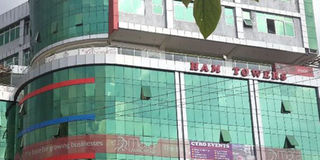Prime
Ham case put syndicated lending at risk, UBA wants law reviewed

DTB had threatened to sell a number of properties under Ham Enterprises over fail to effectively service a $8.3m credit facility. Photo | File
What you need to know:
- The revelation is contained in proposed banking reforms authored by UBA with support from Financial Sector Deepening Uganda and UK Aid.
A ruling in favour of Ham Enterprises against Diamond Trust Bank last year exposed gaps in laws governing syndicate lending, according to Uganda Bankers Association (UBA).
The revelation is contained in proposed banking reforms authored by UBA with support from Financial Sector Deepening Uganda and UK Aid.
In a report, which has since been handed to Bank of Uganda for onward consideration, UBA notes that whereas syndicated lending is a go-to solution in growing economies that have limited means of financing to fund large ventures, a ruling in the Ham verses DTB case in October last year had thrown the whole arrangement off balance, thus the need to address uncertainties that aided the court’s decision.
“The uncertainty that aided the court’s decision needs to be addressed. The [Financial Institutions Act] needs to be amended to clarify what a non-Ugandan lender should be subjected to,” UBA recommends, noting it is not clear whether syndicated lending is regulated under Ugandan laws.
UBA further recommends that the Financial Institutions Act should be amended to eliminate provisions that require foreign lenders to have a Bank of Uganda license before they can lend in Uganda as well as clarify what constitutes agent banking.
Early last year Ham Enterprises lodged an application in the Commercial Division of the High Court in which it was claimed that DTB Uganda had provided DTB Kenya an illegal cover to conduct business in Uganda.
The case had resulted from a notice in which DTB had indicated it would proceed to sell a number of mortgaged properties over Ham’s failure to repay a $8.3m credit facility.
In his judgement Justice Henry Peter Adonyo concurred with the applicant ruling that DTB Uganda had indeed provided DTB Kenya an illegal cover to conduct money laundering by providing financial services in a jurisdiction it was not registered.
The ruling, which has since been appealed, was widely debated with UBA describing it then as a “reckless judgment” that had put Shs5.7 trillion worth of syndicated loans at stake.
In a statement issued then, UBA rallied stakeholders “to join us in addressing the implications of this reckless judgment” to avoid the adverse effects it could have on the country.
It is from this background that UBA wants the Central Bank and Ministry of Finance to correct contractions in the law in order to protect financial institutions involved in syndicated lending.
“The court stated that [DTB Kenya] was a foreign bank. The Financial Institutions Act requires a foreign bank to seek authorisation of Bank of Uganda before it can engage in “financial services business” in Uganda. Court noted that [DTB Uganda] was an agent of a foreign bank, which contravened Financial Institutions Regulations. Court concluded that the respondents acted illegally, unethical and in breach of Trust.
The judgement would imply that any international lender cannot lend in Uganda without a licence from the Bank of Uganda [which BoU clarifies is not the intended position],” UBA notes, government to reform the law and ensure there is clarity about syndicated lending.
Ham verses dtb ruling
The ruling, which has since been appealed, raised questions in regard to what the law provides for for a foreign lender to conduct financial business in Uganda.
Ham had challenged the legality of the $4.5m loan that had been drawn from DTB Kenya and advanced to the company in an application in which Ham had applied for a $8.3m credit facility.




